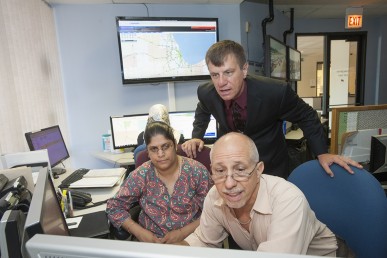UIC’s Artificial Intelligence Lab wins $5.5 million IDOT contract

John Dillenburg, senior research scientist in computer science, with systems specialist Sri Poodipeddi and research engineer Caleb Drake.
Photo: Roberta Dupuis-Devlin. Click on photo for larger image.
The contract, which runs through June 2016, extends a long-term relationship between IDOT and UIC’s AI Laboratory.
“We are always enhancing the Gateway system,” says John Dillenburg, co-principal investigator and project director on the contract.
The new contract will allow the AI Lab to continue bringing real-time traffic information to travelers and create new and improved software systems for traffic control, Dillenburg said.
Delays due to congestion in the Chicago area waste $6.2 billion a year in gasoline, time and pollution, according to the Texas Transportation Institute’s latest data.
Interactive maps developed through the IDOT-UIC partnership reduce this waste by providing travelers information to avoid congestion. The maps can be scrolled and zoomed, allowing users to focus on the most useful information and delete unneeded data. Information is displayed in layers — travel times, congestion, construction, incidents, road labels and shields, dynamic message signs, cameras and special events.
A major project under the research contract will be to expand statewide IDOT’s lane-closure system that now allows contractors in the Chicago area to register and submit requests to close traffic lanes. The online system checks new requests to ensure that a buffer zone is maintained between construction projects — a great improvement over the previous flurry of emails and faxes, Dillenburg said.
The research contract will also fund expansion of real-time congestion reporting south to cover the entire state, and east and west to span the I-94 corridor from Minneapolis/St. Paul to Detroit.
The AI Lab also plans an update of the mobile app to make it available to Windows phones as well as the currently supported iPhones and Androids.
Peter Nelson, professor of computer science, dean of engineering and AI Laboratory director, is principal investigator on the contract. Senior personnel include software engineer Doug Rorem and research engineer Caleb Drake. The research contract supports 16 full-time staff and more than 15 part-time staff and students.
